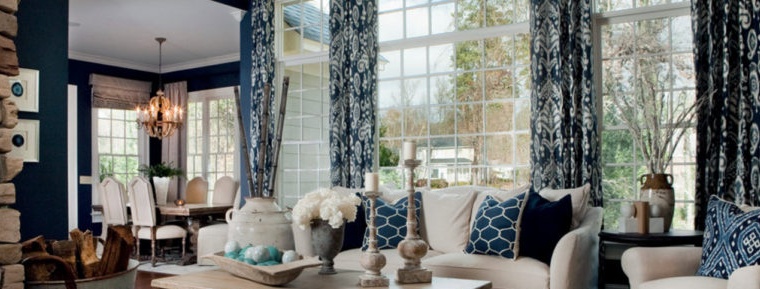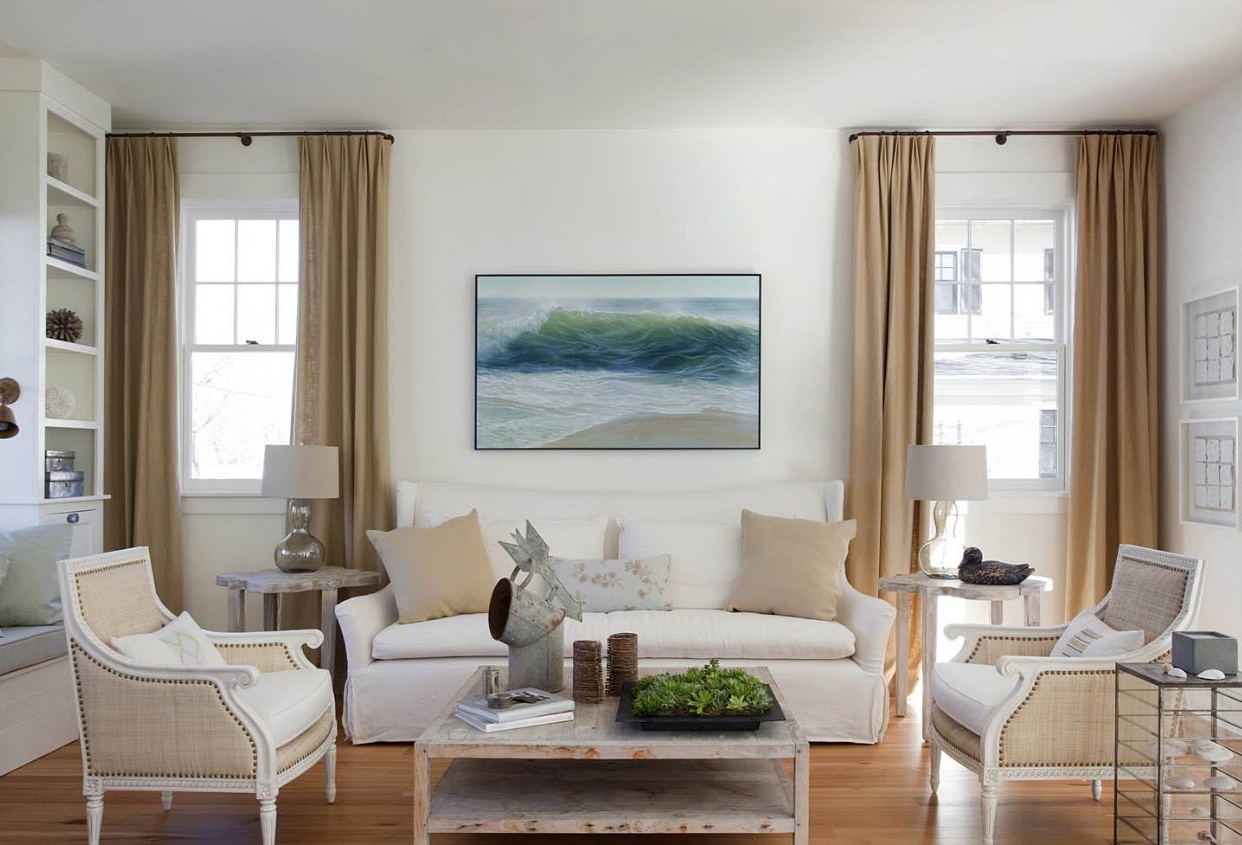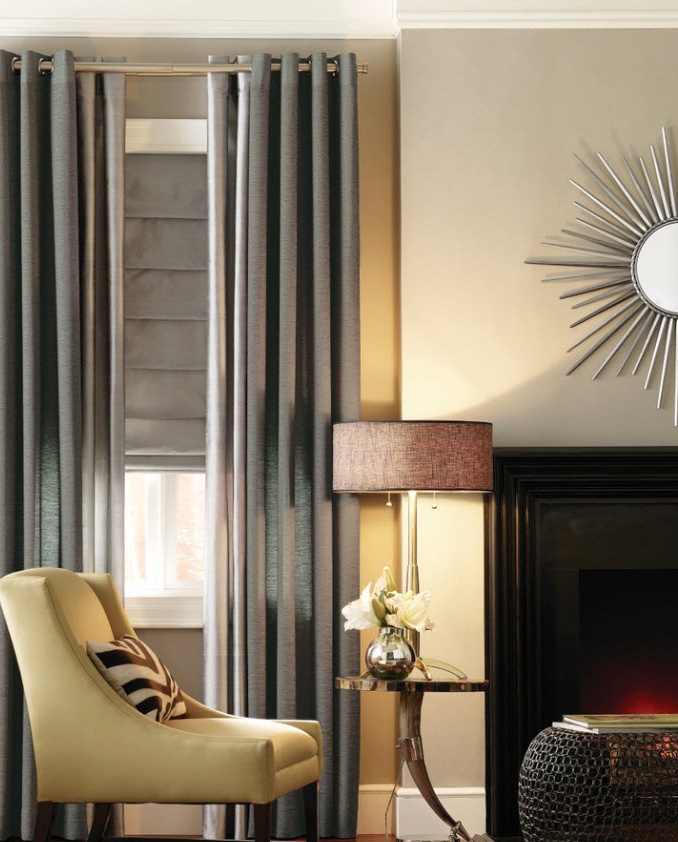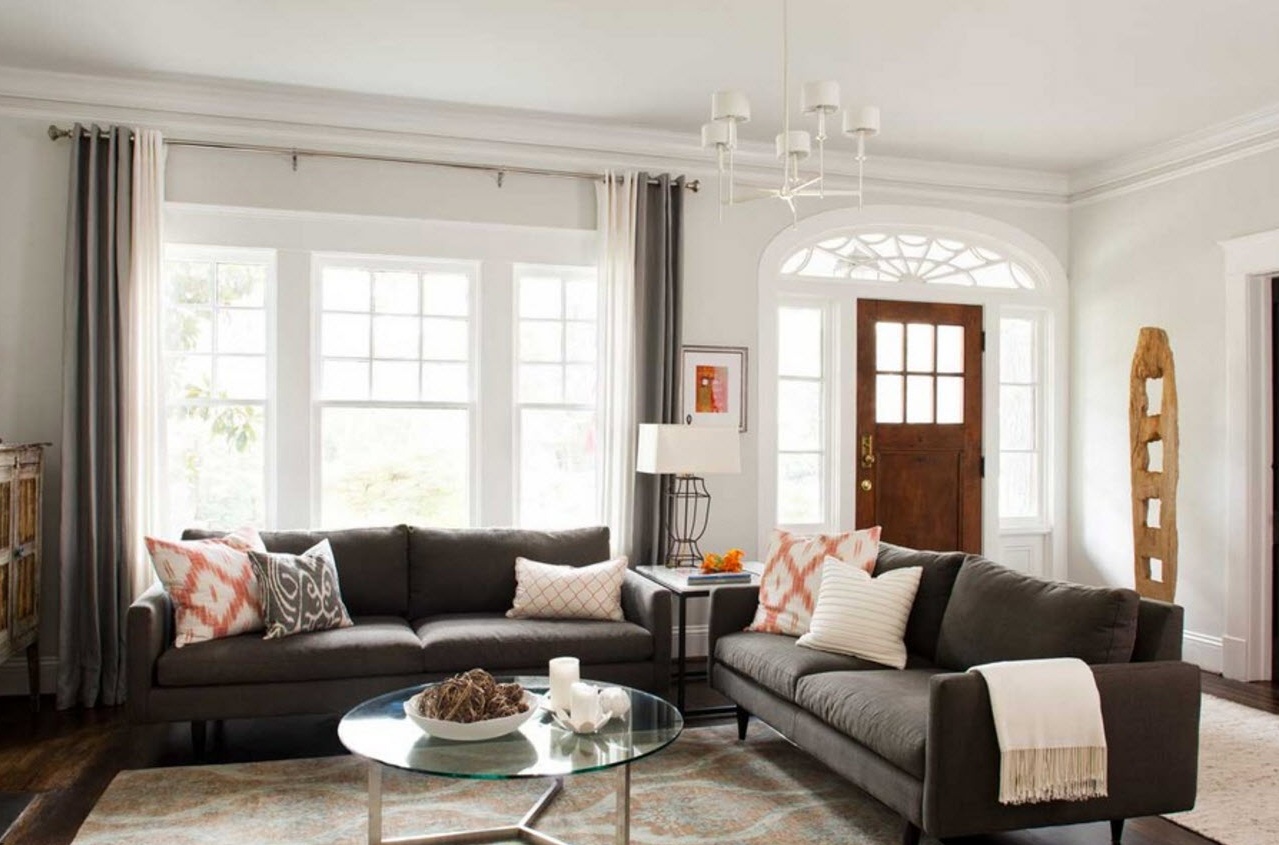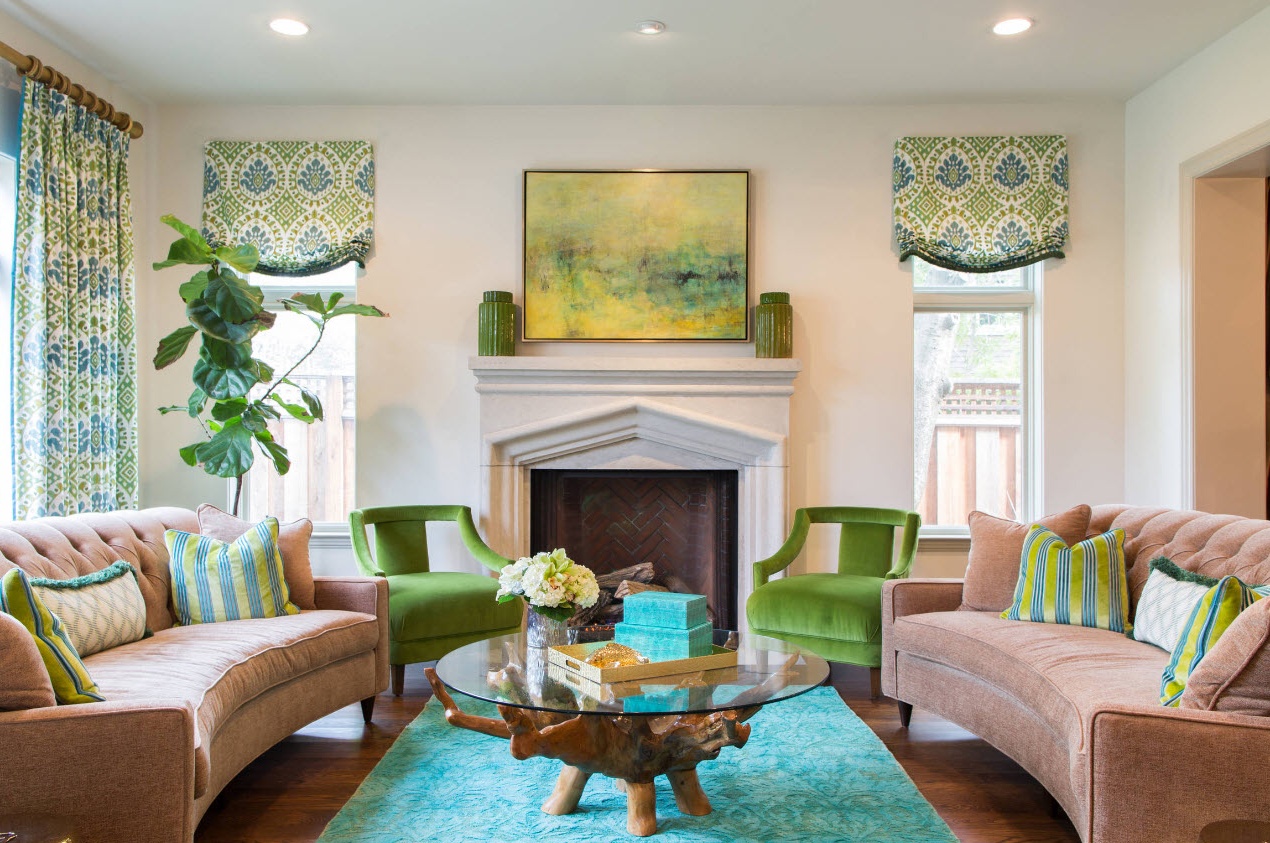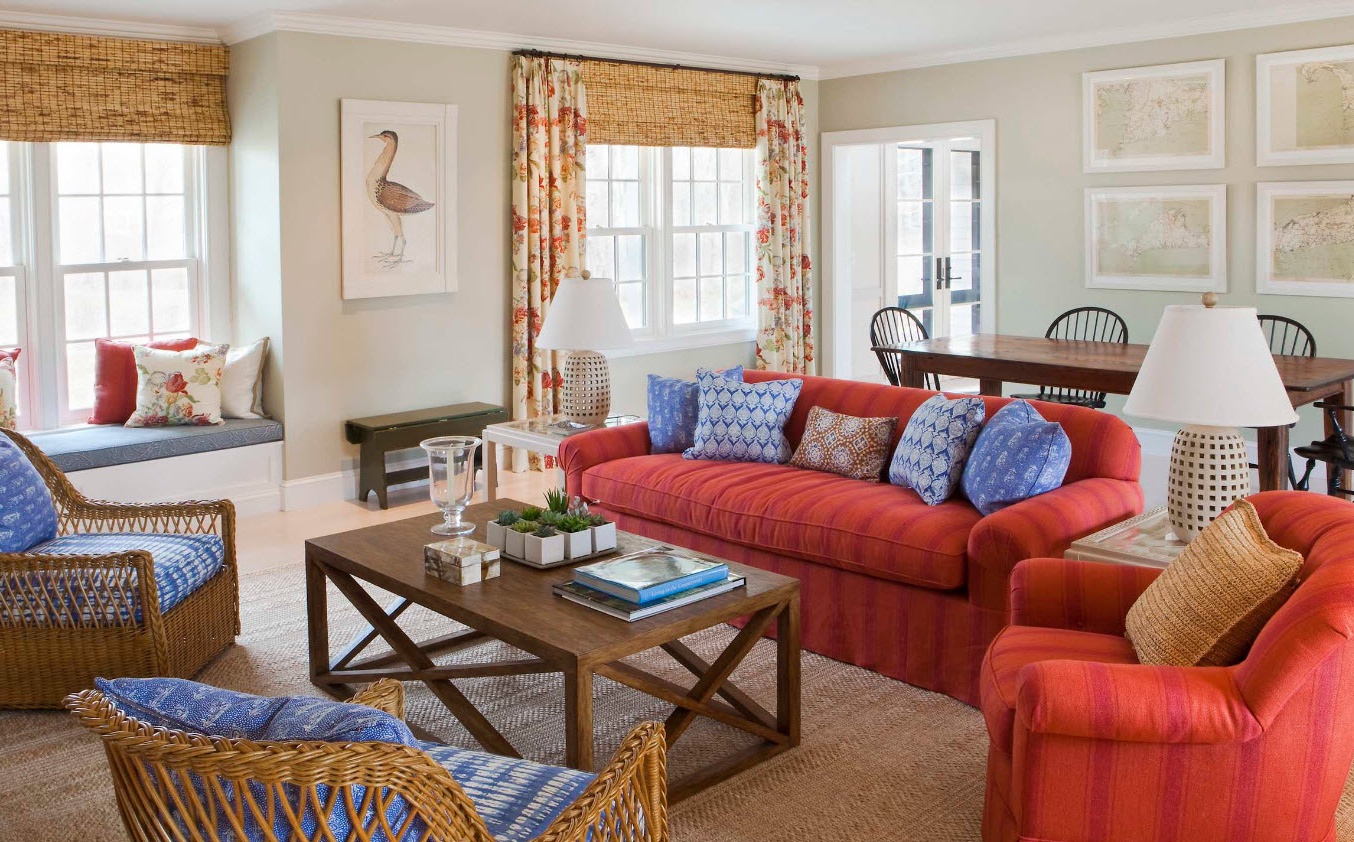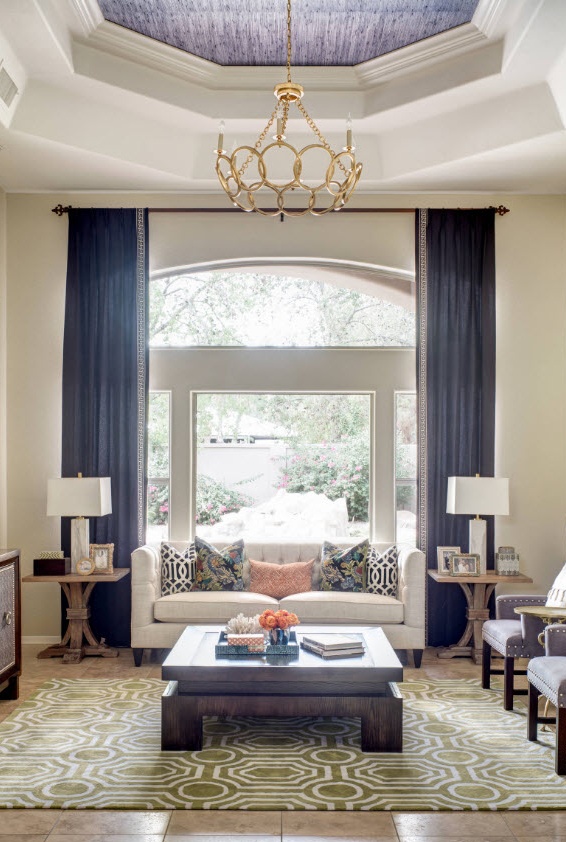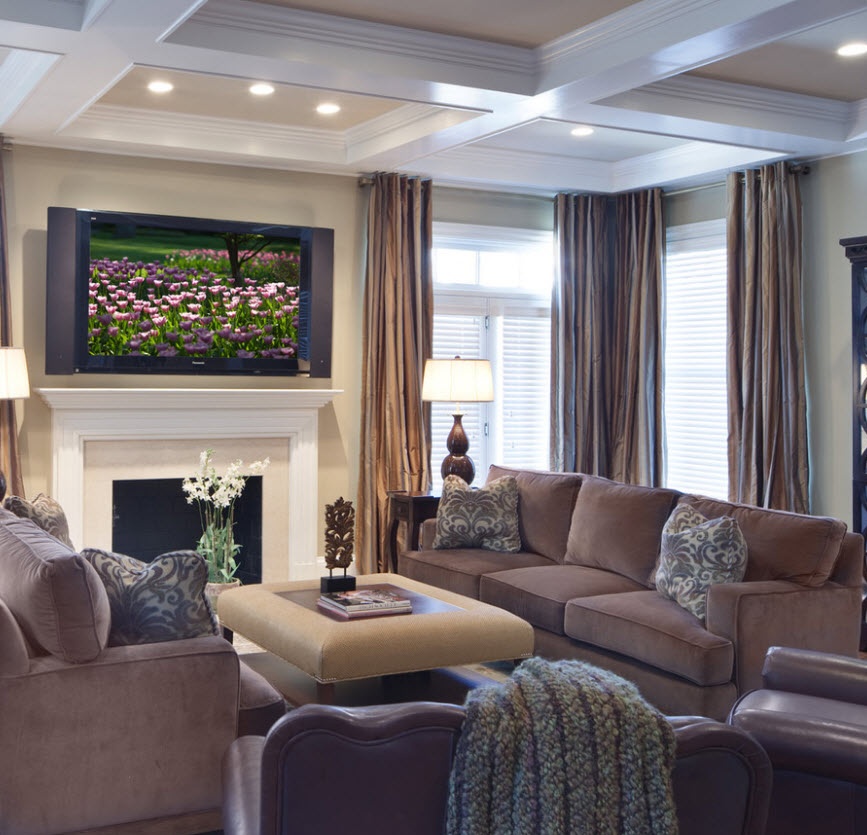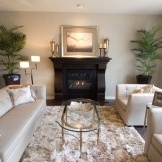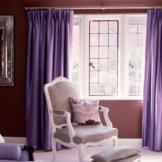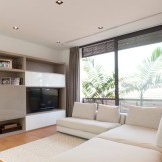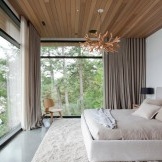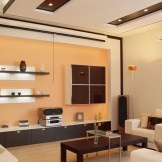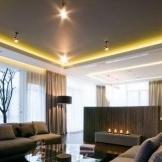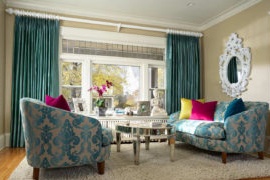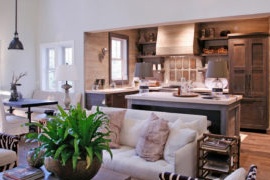Curtains for the hall - design 2018
Hall or living room - the main room in an apartment or private house. It is in this room that the whole family gathers in the evening, here they receive the closest guests or arrange receptions and parties. In a word, the hall is always in the spotlight. Therefore, any owner wants to create an atmosphere of coziness and comfort in the common room, to make the interior not only functional and practical, but also beautiful, modern. Not the last role in shaping the design of the living room or hall is played by textile window decoration. This is as enjoyable as a responsible occupation - the room must be protected from sunlight and prying eyes, but at the same time to maintain the harmony of color, texture and stylistic decisions of the entire interior. So, we suggest that you familiarize yourself with interesting options for decorating the windows of halls with the help of our impressive selection of design projects for rooms of a wide variety of sizes, configurations, and interior styles.
Traditional curtains or versatile window drapery
Classic is always in trend. That is why the direct fabric canvases, flowing down with vertical folds from the cornice to the floor, have been one of the most popular options for decorating windows in the hall for many years. For most of our compatriots, the combination of translucent curtains and traditional thick curtains has long been considered the most optimal way to drapery window openings and balcony blocks in living rooms and halls. But even in this classic way, new decor possibilities appear, combining curtains of other models, fabric combinations in sewing the curtains themselves.
In modern design projects, the option of using only curtains as a drapery of the hall windows is often found. The translucent fabric slightly obscures the sunlight and hides the room from prying eyes. In some cases, this level of dimming is sufficient (if the room is located on the north side of the building or on the first floor, where there are trees, shrubs or buildings nearby).
Methods for attaching classic curtains
One of the most common ways of attaching straight vertical cloths to the cornice is to use hooks and clips. This option is suitable if you do not want to draw special attention to the top of the curtain composition. But if your aspirations are opposite, use original large clips or bright fasteners ...
No less effect can be achieved when choosing bright or contrasting in relation to the decoration of the walls the color of the cornice (white on a dark or colored background, dark on a light wall).
Especially popular in the design of modern halls and living rooms are curtains on grommets - metal or plastic rings that frame the holes in the fabric and are threaded onto a round cornice. Due to the even distribution of the fittings, the curtains fall in perfect identical folds along the vertical of the canvases. The greater the distance between the grommets, the deeper the folds.
Curtains on grommets look at the same time strict and stylish. They fit seamlessly into almost any room design. If your room has a balcony block, the door of which will often open and close, curtains on the eyelets will become a practical design option. Rings easily move along the cornice, and the paintings do not get damaged from the frequent curtaining of the window and balcony door.
Eyelets can be attached not only to the dense fabric of the curtains, but also to the translucent fabric of curtains. Even the airy veil can be equipped with plastic or metal grommets, if you use a non-woven backing to glue the strip at the top of the curtains.The result is an airy image of window openings with excellent functionality.
Another decorative and functional element of the curtain composition that can be used with curtains of a traditional model is a lambrequin. This is a horizontal strip of fabric (rigid or laid in any form), which is located in the upper part of the window drapery and most often closes the entire cornice in width. Lambrequin will be appropriate as a decorative element in the design of windows, if:
- you need to hide the flaws in the decoration or installation of window (balcony) blocks;
- You would like to hide from the eyes of households and guests of the house a cornice;
- a visual increase in the ceiling height in a room would not hurt;
- you need an original and simple completion of the curtain composition.
Lambrequin can be of two types:
- hard or “bando” is a horizontal strip of fabric having a dense base (most often non-woven interlayer). Such a lambrequin introduces some rigor and geometricity in the design of the window, and adds style to the whole interior;
- classic or soft lambrequin can be assembled in any form - to have folds both horizontally and vertically bends. The classic decorative element of the curtain composition brings some romanticism to the mood of window drapery and the whole design of the living room.
Traditional look on the cross over hinges. The most ordinary fabric becomes more interesting, more original, if you focus on the top of the curtain composition. Flip loops can be on ties, buttons or simply sewn with the necessary margin for free stringing on the cornice.
What can be combined with classic window drapery
In addition to the usual combination of curtains with translucent and light fabrics for all of us, there are many ways to create not only reliable protection from sunlight and prying eyes, but also an attractive and modern way of drapery windows in the room. In modern design projects, you can increasingly see a combination of traditional curtains with Roman ones. The model of Roman curtains is a fabric cloth with a width equal to the window, which is assembled by uniform horizontal folds manually or using a drive. Roman curtains come in many modifications. The most common curtains on a rigid basis are classic (fabric is attached to plates, tubes or slats) and frameless models.
Classical (frame) Roman curtains:
Frameless Roman curtains with an arbitrary type of assembly:
If the hall has windows of various modifications (for example, a narrow window and a balcony block), then it is logical to use different models of curtains for drapery window openings. Most often, panoramic windows or balcony blocks are decorated with traditional curtains, and narrow window openings are decorated with Roman models of paintings from the same fabric.
Designers around the world began to actively use bamboo roller blinds in combination with classic fabrics. The ensemble is obtained not only original in appearance, but also functional - bamboo blinds reliably protect the living room from the sun and outsiders, and classical curtains soften the image, add notes of traditional elegance not only to the curtain composition, but also to the entire interior of the hall.
Color scheme for curtains in the hall
Before proceeding with the choice of color for drapery windows in the hall, you need to decide whether you want the paintings to be an accent, appearing in a color “bundle” with any interior elements or “dissolved” in the general palette of the room. The choice of color and print will also depend on the following factors:
- the size of the room;
- the number and scale of window openings;
- the location of the room relative to the cardinal points;
- wall finishes;
- the design of large interior items - upholstery of upholstered furniture, storage system facades (if any).
Universal shades
The universal color options for curtains for the hall include all shades of white, pastel colors - light beige, sand, dusty rose, light blue, muted tone. All light natural shades presented in a monophonic version are able to harmoniously fit into almost any living room design. In this case, the drapery of windows becomes not only a part of the overall picture of the interior, but also dissolves in it, without attracting everyone's attention.
Light curtains always bring some festive mood to the character of the interior, helping to create an easy and relaxed image of the room. Nevertheless, it is better if snow-white curtains (any shade of white) are placed on a darker background - even pastel colors will create an excellent alliance, not to mention more colorful colors or print finishes.
One of the most versatile, neutral and therefore practical colors is gray and all its shades. Many shades of gray can bring notes of calm luxury, nobility to the design of the living room or hall. A room with gray, silver curtains looks balanced, restrained, but at the same time stylish. In addition, gray color is easy to combine with other color schemes, including with bright accents.
The trend that has appeared not so long ago has not lost its popularity - the use of the “ambre” technique for dyeing fabrics. One color smoothly changes to another, often with an intermediate introduction of other shades. The resulting paintings are original and attractive, able to refresh and diversify the color palette of the most ordinary interiors.
Accent colors
If you want to make the design of windows an accent element of the interior, then choose bright, colorful fabrics for the execution of curtain compositions. If the room is small, it will be better if bright curtains become the only accent spot in the interior. In large rooms, a bright tone can be repeated in the upholstery of upholstered furniture or carpet pattern, decorative pillows on sofas and armchairs or lamp shades of lamps.
Accent light does not have to be bright. It can be contrastingly dark and, due to its depth, stand out against the general light background. For many rooms, dark, blackout curtains are not so much a whim of designers as a necessity. But even without calculating functionality, dark canvases on the windows can radically change the mood and character of the interior, adding a touch of drama and mystery.
Designers recommend for those who would like to design the windows of their hall in dark color to use the following shades this season:
- dark emerald;
- dark indigo;
- graphite;
- the color of dark chocolate;
- deep, dark khaki (swamp);
- the color of the overripe plum.
Original prints
In 2018, large geometric prints will be in fashion. Designers recommend using fabrics in which no more than three colors and their shades are involved. The pattern or ornament should be clear, even colorful. But it is important to understand that such a noticeable design of window openings will organically look in rooms of large and medium sizes. In a small living room it is better not to risk using a large and bright pattern on the window drapery.
If in the past season we could often see the use of curtains with bright stripes as a print in the design projects of living rooms and even bedrooms, then this year for interior design tends to use shades close in color group that will create a smooth transition from one color to another . And at the same time, paintings with vertical stripes are able to visually increase the height of the room.
The combination of fabrics and colors
One of the most popular ways of combining fabrics in the manufacture of curtains of the classical model is to highlight the borders of the canvas using a narrow strip of accent color. Combinations of printed fabric and plain material can be used.In any case, the vertical stripes along the edges of the paintings help visually increase the height of the room (the cornice is located under the ceiling, and the curtains touch the floor).
Equally popular is the technique called “colorblock” - a combination of fabrics of different colors horizontally. Bright stripes can be plain or with a pattern. But most often you can find the use of no more than three contrasting colors. Such canvases help visually increase the width of the windows and the entire room if they occupy the entire distance from the wall to the wall.
The combination of fabrics horizontally helps to make the paintings heavier and decorate the curtains at the same time. The denser and heavier material located at the bottom helps stretch the canvas and form sharper folds.

